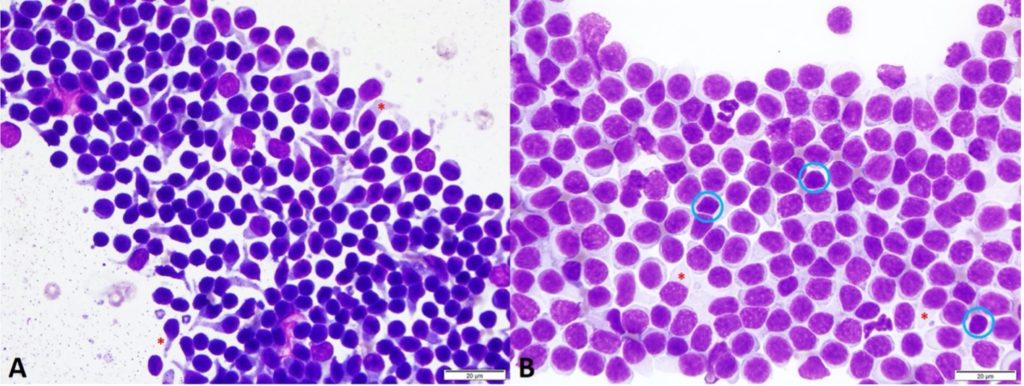T-cell lymphoma is not always “terrible”
Julie Piccione, DVM, MS, DACVP
A 10-year-old female spayed Shih Tzu was presented to her veterinarian for an annual wellness exam. At home, the dog had been doing well but was reported to have less energy. On physical examination, the veterinarian noted mildly to moderately enlarged mandibular and prescapular lymph nodes bilaterally. A fine needle aspirate was collected and sent to the Texas A&M Veterinary Medical Diagnostic Laboratory (TMVDL) for cytologic examination.
On cytologic examination there was a monomorphic population of lymphocytes with only rare plasma cells and non-degenerate neutrophils. The lymphocytes appeared small in the thicker areas of the slides (see Figure 1A). However, in the thinner areas of the slides, the lymphocytes appeared more intermediate in size (see Figure 1B). The lymphocytes often had cytoplasm that was trailing in different directions (see Figure 1). Cells with this morphology are often described as uropods or hand-mirrored. Given the signalment, clinical history, and cytologic findings. A diagnosis of T-zone lymphoma was made. Samples were referred to another laboratory for flow cytometry testing to confirm the diagnosis in this case.

Figure 1. Fine needle aspirate of a lymph node from a 10-year-old FS Shih Tzu with T-zone lymphoma. A: The thick area of the slide showed a monomorphic population of lymphocytes. The nuclei appeared small and there were many hand-mirrored cells with cytoplasm trailing in several different directions (*). B: Thinner areas of the slide still demonstrated a monomorphic population of lymphocytes. However, most cells appeared intermediate in size. Some small, well-differentiated lymphocytes were identified (blue circle). Hand-mirrored cells are still observed (*).
T-zone lymphoma (TZL) is one of several types of T-cell lymphoma. While T-cell lymphoma is often thought to be more aggressive, TZL is actually one of the most indolent forms of lymphoma in dogs, meaning that it is slowly progressive. The median survival time can be several years and treatment with chemotherapeutics does not appear to improve survival times. TZL is not uncommon in the dog. TZL appears to be more common in certain breeds (e.g. Golden Retriever and Shih Tzu). Dogs often have no clinical signs of illness at home. Cranial lymph nodes may be more commonly affected. Recognizing this specific type of lymphoma is imperative to prevent potentially unnecessary treatments and euthanasia.
The hand-mirrored appearance on cytologic preparations is highly suggestive of TZL, especially when observed in conjunction with a monomorphic population of small to intermediate lymphocytes and minimal evidence of reactive lymphoid hyperplasia. However, the presence of hand-mirrored lymphocytes is not pathognomonic for TZL as it can be observed with reactive lymphoid hyperplasia and lymphedema. Providing clinical pathologists with a full patient signalment, including age, sex, and breed, as well as a brief clinical history can improve the odds of a diagnosis with cytology alone.
Flow cytometry can be used to confirm the diagnosis of T-zone lymphoma. Flow cytometry requires a fine needle aspirate sample to be deposited into a mix of saline and serum. Additionally, whole blood can be used for flow cytometry when a lymphocytosis is present. Histologic examination of a whole lymph node may also confirm the diagnosis of T-zone lymphoma in some cases. However, cytologic examination with flow cytometry may be preferred to limit anesthesia and cost associated with lymph node removal and histologic examination.
For more information about test offerings at TVMDL, visit tvmdl.tamu.edu or call one of the agency’s four laboratories.